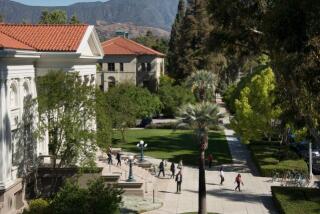Alumni Earning Respect for Claremont
- Share via
David Dreier’s alma mater was derided by some of his smug Eastern colleagues when the young congressman arrived in the House of Representatives in 1980. “I was surrounded by Ivy Leaguers--Harvard, Yale, Princeton,” recalls Dreier, a San Dimas Republican who graduated from Claremont McKenna College. “I remember one of my colleagues asked me if Claremont was a community college.”
But Claremont McKenna, which has a healthy dose of conservatism in the air, is getting a bit more respect these days.
The ascendancy of the GOP in Congress has vaulted a number of Claremont McKenna graduates to positions of prominence: Dreier, a 1975 graduate, is one of Speaker Newt Gingrich’s top lieutenants and chairman of the House Task Force on California. Jeffrey Eisenach, who graduated in 1979, heads the Progress and Freedom Foundation, a think tank close to Gingrich. And four alumni work at the Heritage Foundation, whose conservative positions are now being passed into law.
“Claremont produces some pretty well-prepared graduates of both political persuasions,” said David Fish, who headed Claremont’s College Republicans as a student in the early 1980s and is now a GOP Senate aide. “The school is not necessarily conservative but it has avoided becoming liberal like a lot of schools.”
*
When George Benson, a strong backer of former President Richard Nixon, became the first president of Claremont Men’s College in 1946, he set out to create an institution that would prepare young men--and later, young women--for leadership posts in government, business and the professions. The college (since renamed Claremont McKenna) is one of six institutions in the Claremont Colleges system, developing a reputation for high-voltage instruction in government and economics.
With the new dynamics on Capitol Hill, the political magazine George recently named Claremont McKenna as “a top farm team for conservative think tanks and legislative offices” and one of the “few schools that are breaking down the old guard (Ivy League universities), peopling the Hill with youthful Republican loyalists.”
Claremont has “a laissez faire-loving faculty with plenty of juice on the Hill,” the magazine said--citing former President Ronald Reagan aide Michael Uhlmann, who runs the college’s Washington internship program, and Harry Jaffa, an emeritus professor who was a speech writer for Barry Goldwater. Jaffa, by the way, is one of those responsible for the unforgettable line: “Extremism in defense of liberty is no vice.”
Claremont McKenna economists helped refine supply-side economics during the Reagan years and conservative faculty members’ names pop up frequently on op-ed pages these days defending the Republican agenda in Congress.
In Sacramento, alum Rob Hurtt is the GOP boss in the state Senate. And the college’s Rose Institute of State and Local Government, headed by former GOP State Executive Director Alan Heslop, is well known for the massive demographic databases it uses to analyze state redistricting.
Of course, not all of Claremont McKenna’s successes come from the right side of the political spectrum.
“In a comparative sense, we are more conservative,” said Claremont McKenna President Jack Stark, a Republican. “Ultimately, the test of a college is its alumni. The more successful the alumni are, the better off we are, and we are proud of the liberal and conservative leaders we have produced.”
Take a look at the federal budget impasse, for instance, which has Claremont McKenna graduates on both sides of the negotiating table.
Anne Miller, from the class of 1981, is director of budget review for the Senate Budget Committee and a key GOP numbers cruncher. Representing the White House view is T. J. Glauthier, a 1965 graduate who is a deputy director of the Office of Management and Budget.
*
Dreier has particularly close ties to the campus, which lies within his congressional district.
His father went there and Dreier ran his first congressional campaign in 1978 out of his dorm room at the Claremont Graduate School. (Dreier loves to reveal that he was conceived in an apartment building just off the Claremont campus while his father was an undergraduate. Dreier used that tidbit as ammunition when accused during an early campaign of not having strong ties to the district.)
Dreier says he regularly consults with Claremont professors and alumni while drafting House reform measures. And he has appointed Benson, the college’s 87-year-old founding president, as his campaign chairman every two years since 1980.
Just last week, Dreier quoted the “Federalist Papers” during a floor speech, noting that he first read the book at Claremont. Now a member of the college’s board of trustees, Drier plugs the college whenever he can, and he considers it far more recognizable than when he first arrived in town.
Claremont McKenna government professor John J. Pitney, a former aide at the Republican National Committee, agrees: “When I’m in Washington, I don’t have to explain to people what Clarement is. We’re not yet as well known as Harvard . . . but we’re working on it.”






